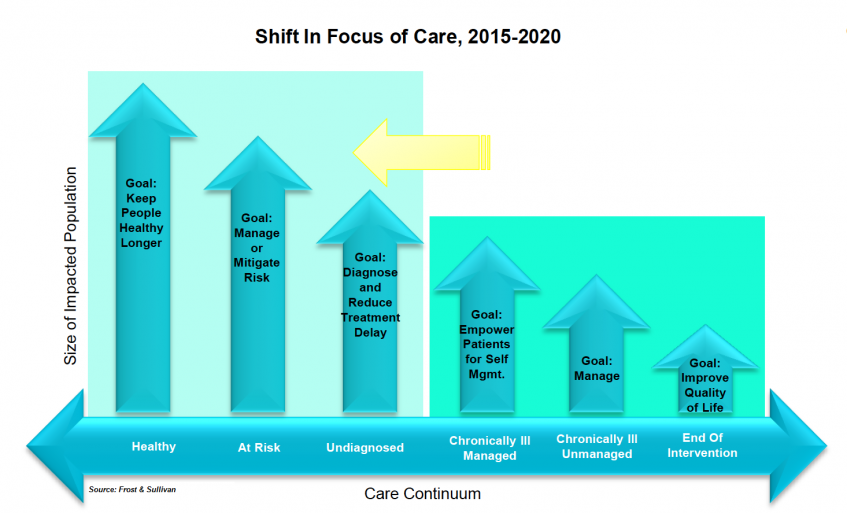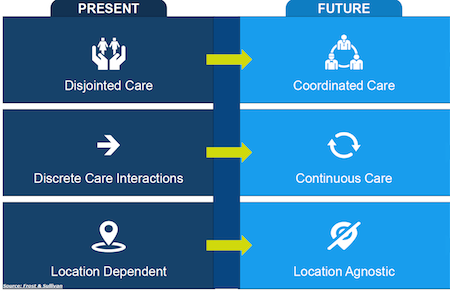


The focus of clinical care will shift toward keeping people healthy longer. Image courtesy of Frost & Sullivan.
Healthcare has historically focused on treating the chronically ill and diseased populations, but things are changing, and it is a “global shift,” Sowmya Rajagopalan, industry principal of Frost & Sullivan, told attendees at The MedTech Conference. “Payers and providers understand that it has to be health management [in order to] to delay the onset of disease.” In addition, “consumerization in healthcare has begun,” she added. Patients “want to know how their health is managed.”
Rajagopalan presented “Top 4 Predictions for Global Medical Devices Industry in 2019” September 25 on the MedTech Exec Talks Stage.
To achieve such a transition in healthcare, Rajagopalan said that monitoring solutions and diagnosis and screening tools will be needed. Hospitals will no longer be the focus—“care will take place at home, 24/7, through screening and monitoring,” she said. And “AI has to be a tool that clinicians use to predict disease.”
There’s also a need to control spending. “In a developed country, hospital inpatient care represents 25-40% of healthcare expenditures, and 11-15% of hospital inpatient costs are attributed to readmission costs,” she said.

The medtech supply chain is undergoing its own transition to accomplish this, shifting from product suppliers to solution providers. “We aren’t just going to sell products—instead we’ll sell processes,” she said.
This “future march toward precision health,” as Rajagopalan calls it, will rely on clinical care consisting of screening and monitoring, sensors and wearables for remote care, a focus on lifestyle, and genetics information. “In the 2020s, we’ll need to capture the data, stratify risks, and make decisions,” she said. “In the connected world, the patient will be at the center.”
Figure at right courtesy of Frost & Sullivan.
With all this in mind, Rajagopalan offered these four medtech predictions:
Virtual reality would enter the operating room. For instance, augmented reality based headsets could project onto the operating area, eliminating the need for the surgeon to have to turn away and look at a screen. “In 2019, we anticipate one approval,” she said.
Orthopedics will be the next frontier for clinical wearables, particularly for rehabilitation. “Any wrong move can impact the implant inside, so sensors, including implantable sensors, can make a difference,” she said.
Amazon will become a “trusted partner” for hospitals. “Expect the Amazonization of the supply chain,” she said.
The smartphone will be the new medical device accessory for clinicians. “Smartphone apps for diseases that impact the quality of life are a welcome change,” she said, mentioning efforts toward solutions for respiratory diseases, mental health, cardiology, and diabetes.
“Patients and the healthcare system want early intervention,” Rajagopalan said. “Patients want to be involved in healthcare decisions and to manage health.”
